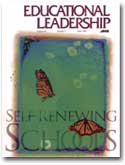In almost 15 years of writing introductions to issues of Educational Leadership, I cannot recall such an impassioned response as the one provoked by my February column, in which I commented on a survey of “What Americans Expect from the Public Schools.” The study, by a nonprofit organization called Public Agenda, found that most people want schools to concentrate on safety, order, and the basics, and that they either oppose, or feel lukewarm about, innovations being promoted by education reformers. I mentioned that a radio commentator, when reporting the survey results, referred scornfully to education “experts” who favor such practices as reducing tracking.
Several letters took me to task for those remarks (see p. 90). Some were bitter, while others just tried to explain, but nearly all disagreed with my defense of current reforms. One or two picked up on the word “expert,” declaring that the real experts are experienced teachers and parents, not theorists, researchers, and editors. They argued correctly that reform efforts are often unsuccessful because of inadequate resources, poor planning, or because the innovation is unworkable on a large scale and has not been properly evaluated before becoming “this year's new thing.”
Only a handful of people wrote letters or called, but those five or six surely speak for hundreds of thousands of others. Without a doubt, many parents, board of education members, citizens, and teachers are deeply worried about the condition of schools and are desperate for what they see as common sense.
I am troubled by those letters. I am disappointed that I gave some readers the impression that I was calling myself an expert or that I think my personal views are superior to those of parents and hard-working teachers. Each of us is an expert in some things but not in others. I recognize that I am not currently an expert in many of the specifics of successful teaching, and I respect those who are.
But professional practice is not just a matter of personal opinion. Our advanced civilization depends on shared knowledge. Progress comes through experimentation, documentation, and willingness to learn from the experiences of others. My perspective on school reform comes partly from personal experience but mostly from research findings and, even more convincing, from the testimony of practicing educators who tell their stories at ASCD meetings and in our magazine.
This month is no exception. Our focus in this issue is the ability of the local school to adapt to changing conditions. Some authors, including Bruce Joyce and Emily Calhoun (p. 51), refer to this quality as “self-renewing” (Joyce et al. 1993). Others, such as Peter Senge (p. 20), author of The Fifth Discipline, speak of the “learning organization.” The idea is that an organization needs to be like a living organism, able to “learn” and change rather than sticking with unproductive routines.
This month's authors describe real, contemporary schools that fit this description. For example, Richard Sagor (p. 24) tells of elementary schools in Vancouver, Washington, and West Linn, Oregon. Richard DuFour, a school superintendent, writes about Adlai Stevenson High School in Lincolnshire, Illinois, and Joyce Greenberg Lott describes South Brunswick High School in central New Jersey. Interestingly, not only have the teachers and principals of these schools become adept at gathering data, analyzing choices, and making sound decisions, but the practices they have tried and found to be effective are often the very reforms that members of the public are said to be skeptical about.
That does not prove, of course, that those reforms would work in other settings. Indeed, what it may suggest is that Andy Hargreaves (p. 14) is right in his contention that successful change depends on building collaborative cultures among teachers and with the wider community. This process, which Hargreaves calls “reculturing,” specifically involves all elements of the school community, including those “who normally are not considered to be on the leading edge of school initiatives” as well as doubtful parents and citizens. Not easy, perhaps, but in this time of skepticism and distrust, it is the surest route to authentic renewal.
